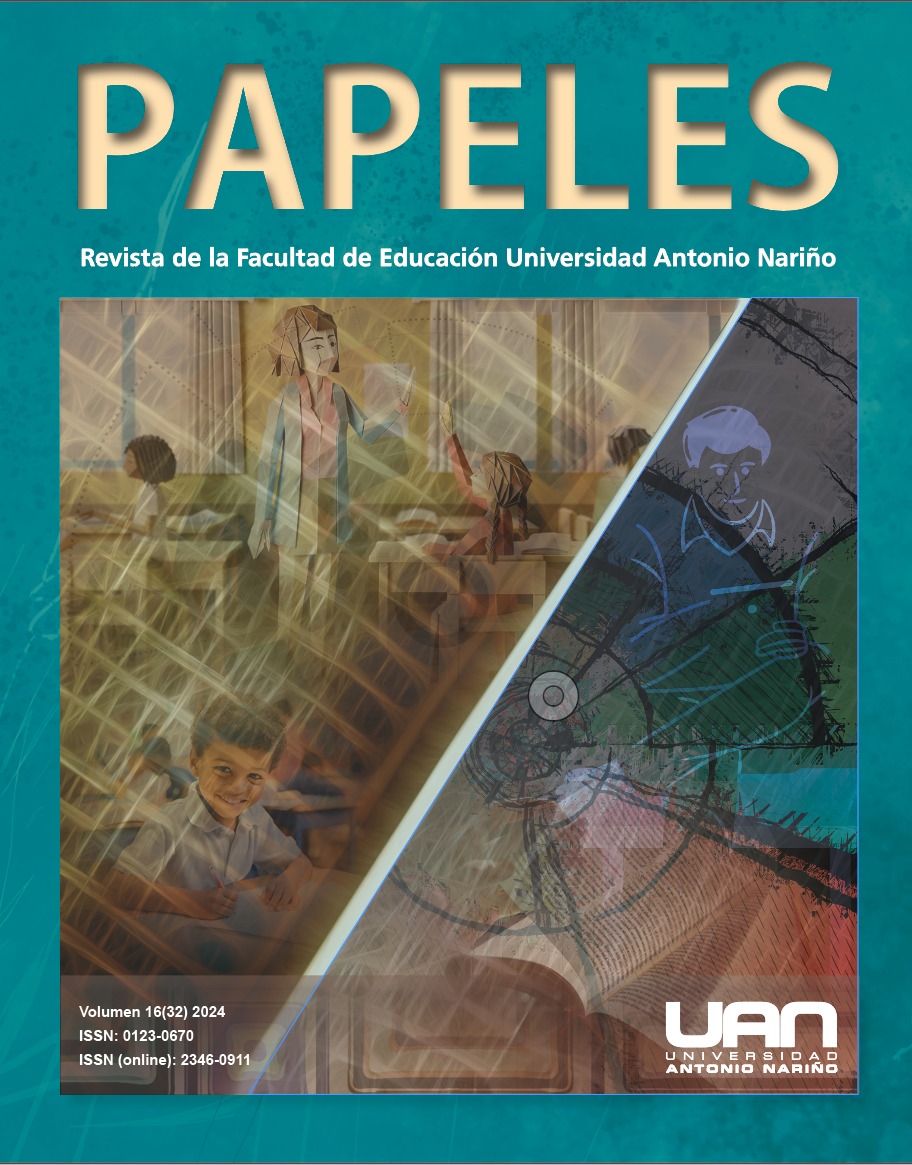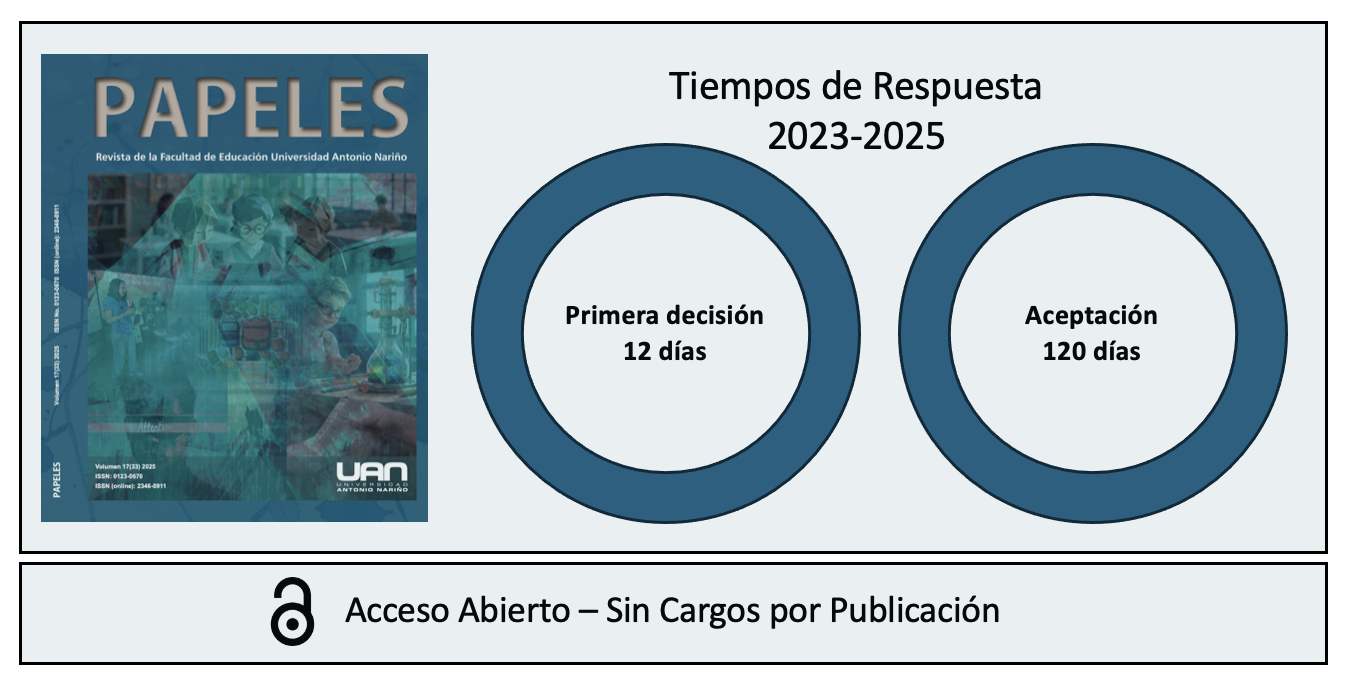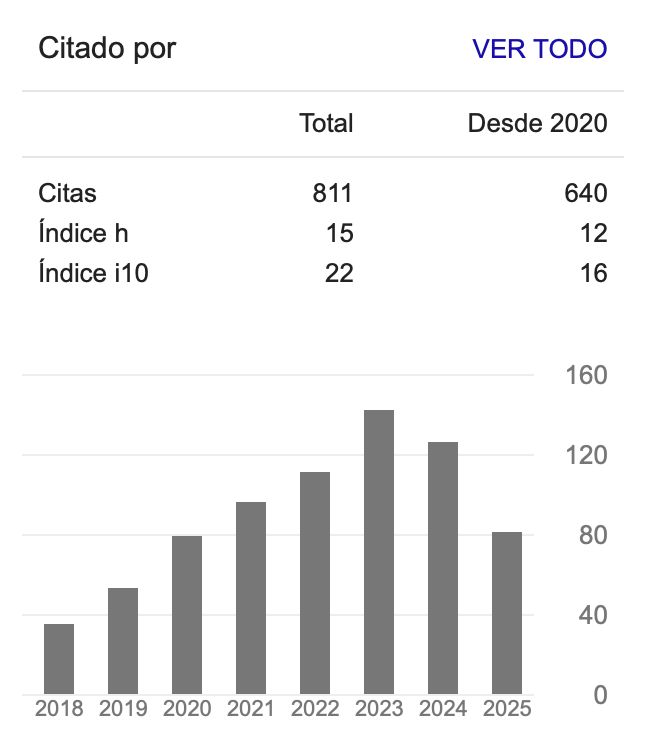Evaluación de la mejora de la competencia en conciencia y expresión cultural mediante el aprendizaje basado en el juego y la literatura en ILE en educación secundaria
Testing the Improvement of Cultural Awareness and Expression Competence through Game-based Learning and Literature in EFL in Secondary Education
DOI:
https://doi.org/10.54104/papeles.v16n32.1971Palabras clave:
Aprendizaje basado en juegos (ABJ), Competencia clave en conciencia y expresión cultural, inglés como lengua extranjera (ILE), literatura, género ficción detestivescaResumen
Introducción: este estudio investiga la posible mejora de la competencia clave conciencia cultural y la expresión en inglés como lengua extranjera (EFL) mediante la aplicación de una metodología integrada de aprendizaje basado en juegos (GBL) combinada con literatura. Metodología: utilizando un enfoque de método cualitativo, se implementó una secuencia didáctica en una clase de 3º ESO compuesta por 30 estudiantes. Resultados y discusión: los resultados indican que el GBL y la literatura pueden fomentar eficazmente competencias clave y destrezas básicas de EFL de forma atractiva y motivadora. A pesar del tiempo limitado, los estudiantes demostraron una mayor comprensión de la cultura británica y del subgénero de las novelas cortas de detectives, al mismo tiempo que ampliaban de forma natural su vocabulario y sus destrezas gramaticales. Además, la mayor motivación observada entre los estudiantes pone de relieve la importancia del aprendizaje activo. Conclusiones: la investigación ofrece valiosas perspectivas cualitativas y cuantitativas para futuros estudios en este campo.
Descargas
Citas
Bertinetti, P. (Ed.) (1995). Detective stories: Arthur Conan Doyle et al. Cideb Editrice.
Caleya Dalmau, M. F. de, Bobkina, J., & Sarto Martes, M.ª del P. (2012). The use of literature as an advanced technique for teaching English in the EFL/ESL classroom. Educación y Futuro: Revista de Investigación Aplicada y Experiencias Educativas, 27, 217-236. https://dialnet.unirioja.es/servlet/articulo?codigo=4060948
Chou, M. J. (2017). Board games play matters: A rethinking on children’s aesthetic experience and interpersonal understanding. Eurasia Journal of Mathematics, Science and Technology Education, 13(6), 2405-2421. https://doi.org/10.12973/eurasia.2017.01232a DOI: https://doi.org/10.12973/eurasia.2017.01232a
Colby, R. S. (2017). Game-based pedagogy in the writing classroom. Computers and Composition, 43, 55-72. https://doi.org/10.1016/j.compcom.2016.11.002 DOI: https://doi.org/10.1016/j.compcom.2016.11.002
Deardorff, D. K. (2006). Identification and assessment of intercultural competence as a student outcome of internationalization. Journal of Studies in International Education, 10(3), 241-266. https://doi.org/10.1177/1028315306287002 DOI: https://doi.org/10.1177/1028315306287002
Decreto 107/2022, de 5 de agosto, del Consell, por el que se establece la ordenación y el currículo de la Educación Secundaria Obligatoria. https://noticias.juridicas.com/base_datos/CCAA/735994-d-107-2022-de-5-ago-ca-valencian-establece-la-ordenacion-y-el-curriculo-de.html
Doyle, A. (1982) Silver Blaze. In P. Bertinetti (Ed.), Detective stories: Arthur Conan Doyle et al. Cideb Editrice.
Eden, C. A., Chisom, O. N., & Adeniyi, I. S. (2024). Cultural competence in education: Strategies for fostering inclusivity and diversity awareness. International Journal of Applied Research in Social Sciences, 6(3), 383-392. https://doi.org/10.51594/ijarss.v6i3.895 DOI: https://doi.org/10.51594/ijarss.v6i3.895
Federación de Gremios de Editores de España. (2023). Informe sobre el sector editorial español: Año 2022. https://www.federacioneditores.org/img/documentos/Informe_sector_editorial_esp2022.pdf
Ford, B. A., Stuart, D. H., & Vakil, S. (2014). Culturally responsive teaching in the 21st century inclusive classroom. Journal of the International Association of Special Education, 15(2), 56-62.
García Vaquero, A. F., & Alcantud Díaz, M. (2023). Exploring Tolkien’s literary universe in the EFL classroom: Ap-proaching Literature through robotics-enhanced inquiry-based learning. Digital Education Review, 44, 1-12. https://doi.org/10.1344/der.2023.44.1-12 DOI: https://doi.org/10.1344/der.2023.44.1-12
George, A. S., George, A. H., Baskar, T., & Shahul, A. (2023). Screens steal time: How excessive screen use impacts the lives of young people. Partners Universal Innovative Research Publication, 1(2), 157-177. https://doi.org/10.5281/zenodo.10250536
Getahun, E. (2022). Are attention spans decreasing? The Student Movement, 104(9). https://www.andrews.edu/life/student-movement/issues/2022-02-25/ideas-are-attention-spans-decreasing-.html
Ghazal, S., & Singh, S. (2016). Game-based language learning: Activities for ESL classes with limited access to technology. ELT Voices, 6(4), 1-8.
Gower, R. (1986). Can stylistic analysis help the EFL learner to read literature? Elt Journal, 40(2), 125-130. https://doi.org/10.1093/elt/40.2.125 DOI: https://doi.org/10.1093/elt/40.2.125
Hilt, J. A. (2019). Dependencia del celular, hábitos y actitudes hacia la lectura y su relación con el rendimiento académico. Apuntes Universitarios, 9(3), 103-116. https://doi.org/10.17162/au.v9i3.384 DOI: https://doi.org/10.17162/au.v9i3.384
Isaacs, S. (2015). The difference between gamification and game-based learning. Association for Supervision and Curriculum Development.
Jargon, J. (2022, April 2). TikTok brain explained: Why some kids seem hooked on social video feeds. WSJ. https://www.wsj.com/articles/tiktok-brain-explained-why-some-kids-seem-hooked-on-social-video-feeds-11648866192
Johnson, T. (n.d.). Gamification versus game-based learning. Laureate Network Office. HBO Toolkit.
Johnston, O., Wildy, H., & Shand, J. (2023). Teenagers learn through play too: Communicating high expectations through a playful learning approach. The Australian Educational Researcher, 50(3), 921-940. https://doi.org/10.1007/s13384-022-00534-3 DOI: https://doi.org/10.1007/s13384-022-00534-3
Khatib, M., Rezaei, S., & Derakhshan, A. (2011). Literature in EFL/ESL classroom. English Language Teaching, 4(1), 201-208. https://files.eric.ed.gov/fulltext/EJ1080411.pdf DOI: https://doi.org/10.5539/elt.v4n1p201
Kourova, A., & Modianos, D. (2013). Inter-cultural awareness and its role in enriching students’ communicative competence. The International HETL Review, 2013, 60-70. https://www.hetl.org/wp-content/uploads/2013/09/HETLReview2013SpecialIssueArticle6.pdf
Maroudi, K. M. (2022). Introducing young adult literature in the EFL [doctoral dissertation, Aristotle University of Thessaloniki]. https://ikee.lib.auth.gr/record/340756/files/GRI-2022-36049.pdf
Márquez-Gómez, A., & Alcantud-Díaz, M. (2019). Gamification or the ludic expectations of literacy. Filoteknos, 9. https://cejsh.icm.edu.pl/cejsh/element/bwmeta1.element.desklight-63a8c191-50f7-4c4f-969a-11a3aab5bad8
McKay, S. (2001). Literature as content for ESL/EFL. In M. Celce-Murcia (Ed.), Teaching english as a second or foreign language (3rd, pp. 319-332). Heinle & Heinle.
Mikasyte, V. (2018). Gamified EFL instructions: An overview of the most recent research trends. In Proceedings of the IVUS International Conference on Information Technology (vol. 712). https://ceur-ws.org/Vol-2145/p02.pdf
Papastergiou, M. (2009). Digital game-based learning in high school computer science education: Impact on educational effectiveness and student motivation. Computers & Education, 52(1), 1-12. https://doi.org/10.1016/j.compedu.2008.06.004 DOI: https://doi.org/10.1016/j.compedu.2008.06.004
Pinar-Pérez, J. M., Morales-Arsenal, R., Fernández-Moya, M., Cuadros-Solas, P., & Salvador, C. (2021, February). Mitigating deficiencies of generation Z through new educational methodologies in a business statistic course. In Proceedings INNODOCT/20. International Conference on Innovation, Documentation, and Education (pp. 81-88). Universitat Politècnica de València. https://doi.org/10.4995/INN2020.2020.11821 DOI: https://doi.org/10.4995/INN2020.2020.11821
Recio, O. (2007). Jueducación en el aula: El valor didáctico de los juegos. https://proyectoscprgijon.es/gamificacion/wp-content/uploads/recursos/Oscar%20Recio%20-%20Los%20juegos%20en%20el%20aula.pdf
Reyes-Torres, A., Villacañas-de-Castro, L. S., & Pardo, B. S. (Eds.). (2014). Thinking through children’s literature in the classroom. Cambridge Scholars Publishing.
Soler Pardo, B., & Alcantud Díaz, M. (2020). A SWOT analysis of the communicative English language skills improvement programme: A tool for autonomous EFL learning. Complutense Journal of English Studies, 28(19), 109-120. https://dx.doi.org/10.5209/cjes.63845 DOI: https://doi.org/10.5209/cjes.63845
Vromans, P., Korzilius, H., Bücker, J., & de Jong, E. (2023). Intercultural learning in the classroom: Facilitators and challenges of the learning process. International Journal of Intercultural Relations, 97, 101907. https://doi.org/10.1016/j.ijintrel.2023.101907 DOI: https://doi.org/10.1016/j.ijintrel.2023.101907
Vygotsky, L. (1966). Igra i ee rol v umstvennom razvitii rebenka, Voprosy psihologii. Problems of Psychology, 12(6), 62-76.
Xyst, K. (2016). Constructivism, dewey, and academic advising. NACADA Journal, 36(2), 11-19. https://doi.org/10.12930/NACADA-14-027 DOI: https://doi.org/10.12930/NACADA-14-027
Descargas
Publicado
-
Resumen392
-
PDF 138
-
LENS 15
-
XML 31
Cómo citar
Número
Sección
Categorías
Licencia
Derechos de autor 2024 María Alcantud-Díaz; Isabella Monello Álvarez

Esta obra está bajo una licencia internacional Creative Commons Atribución-SinDerivadas 4.0.







 Portal de Ciencia Abierta
Portal de Ciencia Abierta